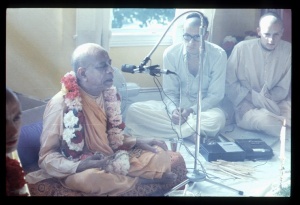CC Madhya 22.110 (1975): Difference between revisions
(Vanibot #0027: CCMirror - Mirror CC's 1996 edition to form a basis for 1975) |
(Vanibot #0020: VersionCompareLinker - added a link to the Version Compare feature) |
||
| Line 2: | Line 2: | ||
<div style="float:left">'''[[Sri Caitanya-caritamrta (1975)|Śrī Caitanya-caritāmṛta (1975)]] - [[CC Madhya (1975)|Madhya-līlā]] - [[CC Madhya 22 (1975)|Chapter 22: The Process of Devotional Service]]'''</div> | <div style="float:left">'''[[Sri Caitanya-caritamrta (1975)|Śrī Caitanya-caritāmṛta (1975)]] - [[CC Madhya (1975)|Madhya-līlā]] - [[CC Madhya 22 (1975)|Chapter 22: The Process of Devotional Service]]'''</div> | ||
<div style="float:right">[[File:Go-previous.png|link=CC Madhya 22.109 (1975)|Madhya-līlā 22.109]] '''[[CC Madhya 22.109 (1975)|Madhya-līlā 22.109]] - [[CC Madhya 22.111 (1975)|Madhya-līlā 22.111]]''' [[File:Go-next.png|link=CC Madhya 22.111 (1975)|Madhya-līlā 22.111]]</div> | <div style="float:right">[[File:Go-previous.png|link=CC Madhya 22.109 (1975)|Madhya-līlā 22.109]] '''[[CC Madhya 22.109 (1975)|Madhya-līlā 22.109]] - [[CC Madhya 22.111 (1975)|Madhya-līlā 22.111]]''' [[File:Go-next.png|link=CC Madhya 22.111 (1975)|Madhya-līlā 22.111]]</div> | ||
{{CompareVersions|CC|Madhya 22.110|CC 1975|CC 1996}} | |||
{{RandomImage}} | {{RandomImage}} | ||
==== TEXT 110 ==== | ==== TEXT 110 ==== | ||
| Line 20: | Line 19: | ||
<div class="synonyms"> | <div class="synonyms"> | ||
tasmāt-therefore; bhārata-O descendant of Bharata; sarva-ātmā-the all pervasive Lord, who is situated in everyone's heart; bhagavān-the Supreme Personality of Godhead; hariḥ-Lord Hari, who takes away all the miserable conditions of material existence; īśvaraḥ-the supreme controller; śrotavyaḥ-to be heard about (from bona fide sources); kīrtitavyaḥ-to be glorified (as one has heard); ca-also; smartavyaḥ-to be remembered; ca-and; icchatā-by a person desiring; abhayam-freedom from the fearful condition of material existence. | |||
</div> | </div> | ||
| Line 27: | Line 26: | ||
<div class="translation"> | <div class="translation"> | ||
" 'O descendant of Bharata! O Mahārāja Parīkṣit! The Supreme Personality of Godhead, who is situated in everyone's heart as Paramātmā, who is the supreme controller and who always removes the miseries of living entities, must always be heard about from reliable sources, and He must be glorified and remembered by one who wishes to become fearless.' | |||
</div> | </div> | ||
| Line 34: | Line 33: | ||
<div class="purport"> | <div class="purport"> | ||
This is a quotation from Śrīmad-Bhāgavatam ([[SB 2.1.5]]). It is | This is a quotation from Śrīmad-Bhāgavatam ([[SB 2.1.5|2.1.5]]). It is one's duty to understand the Supreme Personality of Godhead through the hearing process. This is called śrotavyaḥ. If one has heard properly about the Supreme Personality of Godhead, his duty is to glorify the Lord and preach His glories. This is called kīrtitavyaḥ. When one hears about the Lord and glorifies Him, it is natural to think of Him. This is called smartavyaḥ. All this must be carried out if one actually wants to be immune from fear. | ||
</div> | </div> | ||
Latest revision as of 14:08, 27 January 2020

A.C. Bhaktivedanta Swami Prabhupada
TEXT 110
- tasmād bhārata sarvātmā
- bhagavān harir īśvaraḥ
- śrotavyaḥ kīrtitavyaś ca
- smartavyaś cecchatābhayam
SYNONYMS
tasmāt-therefore; bhārata-O descendant of Bharata; sarva-ātmā-the all pervasive Lord, who is situated in everyone's heart; bhagavān-the Supreme Personality of Godhead; hariḥ-Lord Hari, who takes away all the miserable conditions of material existence; īśvaraḥ-the supreme controller; śrotavyaḥ-to be heard about (from bona fide sources); kīrtitavyaḥ-to be glorified (as one has heard); ca-also; smartavyaḥ-to be remembered; ca-and; icchatā-by a person desiring; abhayam-freedom from the fearful condition of material existence.
TRANSLATION
" 'O descendant of Bharata! O Mahārāja Parīkṣit! The Supreme Personality of Godhead, who is situated in everyone's heart as Paramātmā, who is the supreme controller and who always removes the miseries of living entities, must always be heard about from reliable sources, and He must be glorified and remembered by one who wishes to become fearless.'
PURPORT
This is a quotation from Śrīmad-Bhāgavatam (2.1.5). It is one's duty to understand the Supreme Personality of Godhead through the hearing process. This is called śrotavyaḥ. If one has heard properly about the Supreme Personality of Godhead, his duty is to glorify the Lord and preach His glories. This is called kīrtitavyaḥ. When one hears about the Lord and glorifies Him, it is natural to think of Him. This is called smartavyaḥ. All this must be carried out if one actually wants to be immune from fear.